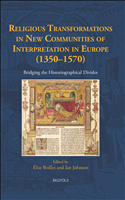Religious Transformations in New Communities of Interpretation in Europe (1350-1570) : Bridging the Historiographical Divides
275 p.
This volume brings together medievalist and early modernist specialists, whose research fields are traditionally divided by the jubilee year of 1500, in order to concentrate on the role of the laity (and those in holy orders) in the religious transformations characterizing the 'long fifteenth century' from the flourishing of the Devotio Moderna to the Reformation and Counter-Reformation.Recent historiography has described the Christian church of the fifteenth century as a world of 'multiple options', in which the laity was engaged with the clergy in a process of communication and negotiation leading to the emergence of hybrid forms of religious life. The religious manifestations of such 'new communities of interpretation' appear in an array of biblical and religious texts which widely circulated in manuscript before benefiting from the new print media.This collection casts a spectrum of new yet profoundly historical light on themes of seminal relevance to present-day European society by analysing patterns of.
inclusion and exclusion, and examining shifts in hierarchic and non-hierarchic relations articulated through religious practices, texts, and other phenomena featuring in the lives of groups and individuals. The academic team assembled for this collection is internationally European as well as interdisciplinary and multidisciplinary in its methodology. [Publisher's text].
Special access authorizations may apply; please contact us for further information.
-
Informazioni


